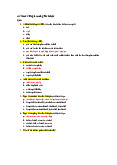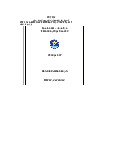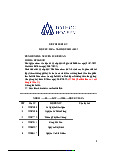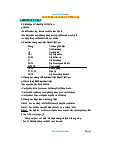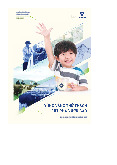



Preview text:
A. PRONUNCIATION.
Choose one word whose underlined part is pronounced differently from the others. 1.A. blankets B. prepositions C. weekends D. partners 2.A. gather B. entrance C. family D. Saturday 3.A. well-qualified B. invited C. modernized D. learned 4.A. aloud B. found C. council D. course B.LANGUAGE FOCUS.
Question I. Write the correct form of the verb in each bracket.
1.Look! A girl _______ (ride) a water buffalo.
2.Loan _______ (not finish) her homework yet.
3.They used _______ (write) to each other every month when they were at school.
4.We wish we _______ (know) his decision now.
5.______they ______ (practice) their music lesson last night?
Question II. Circle the best option A, B, C or D to complete each sentence.
1._______ lunch, everyone leaves the room. A. before B. after C. since D. for
2.Would you like to go to the cinema with me _______ Sunday evening? A. in B. at C. to D. on
3.He’s lazy, _______ his parents are very worried. A. so B. because C. for D. as
4.She asked me if I_______ a driving licence. A. have B. having C. had D. to have
5.People did everything without the help of modern equipment, _______? A. did they B. didn’t they C. did it D. did they
Question III.Give the correct form of the words given in brackets.
1.They are having a ______(WONDER) time in Da Lat.
2.Mr and Mrs.John were very impressed by the _____ (FRIEND) of Vietnamese people.
3.My brothers are _____(COLLECT). They have collected a lot of foreign stamps.
4.Getting to the village is a very ______(INTEREST) journey.
Question IV.Find and correct the mistake in each sentence. 1. I wish (A) I can (B) travel to (C) the countryside next week (D) . 2. In (A)
Saturday afternoon, Minh invited (B) his (C) friends to (D) have dinner. 3. The letter (A) should been (B) delivered (C) in the afternoon (D) . C.READING.
Complete the passage with the words in the box, then answer the questions bellow.
Broken; invented; shortage; is; papermaking; exported;
Paper was __________ (1) by the Chinese in the first century A.D. The art of papermaking took 700
years to reach the Muslim world and another 700 years to get to Britain.
Most paper __________ (2) made from wood. When the trees are cut down, they are carried by land
or water to paper mills. Here they are cut up and the wood is __________ (3) up into fibers, mixed
with water and chemicals. This wood pulp is then dried up on a machine and made into paper.
Papermaking is an important British industry, and paper from Britain is __________ (4) to South
Africa, Australia and many other countries. Some of the wood used in British __________ (5) industry
comes from trees grown in Britain, but wood is also imported from other countries such as Norway.
One tree is needed for every 400 copies of a forty-page newspaper. If half the adults in Britain each
day buy one daily paper, this uses up over 40,000 trees a day. Trees are cut down faster than they
can be replaced, so there may be a paper __________ (6) before the year 2020. Answer the questions:
1.Who was paper invented by?
-> ……………………………………………………………………………… 2.What is paper made from?
-> …………………………………………………………………………………………
3.Where is paper from Britain exported to?
-> ……………………………………………………………………………………… 4.What is the passage about?
-> …………………………………………………………………………………………… D.WRITING.
Question I. Complete the second sentence so that it has a similar meaning to the first one.
1.Lan cannot visit her pen pal in Malaysia.
->Lan wishes she……………………………………………………………………………
2.“Don’t stay up so late”, my father said.
-> My father told me………………………………………………………………………..
3.We repainted the house last week.
-> The house ………………………………………………………………………………..
4. Karen plays the piano very well, doesn’t she?
-> Does Karen ……………………………………………………………………………..?
5.You must do this exercise carefully.
-> This exercise …………………………………………………………………………….
Question II.Complete the sentences, using the words given.
1. My cousin / is / used to / wear / casual clothes.
-> ……………………………………………………………………………………
2.The computer / not / work, / he / took / it back / the shop.
-> ……………………………………………………………………………………
3. He asked / if / I / be / free / that night.
-> ……………………………………………………………………………………
4. In Vietnam, water puppets / make / of wood.
-> ………………………………………………………………………………… ĐÁP ÁN A. PRONUNCIATION. 1.A 2.B 3.B 4.D B.LANGUAGE FOCUS.
Question I.Write the correct form of the verb in each bracket. 1.is riding 2.has not finished 3.to write
4.knew/ could know 5.Did - practice
Question II.Circle the best option A, B, C or D to complete each sentence. 1.B 2.D 3.A 4.C 5.B
Question III.Write the correct form of the words given in brackets. 1.wonderful 2.friendliness 3.collectors 4.interesting
Question IV.Find and correct the mistake in each sentence. 1. B -> could 2. A -> On 3. B -> be C.READING.
Complete the passage with the words in the box. 1. invented 2.is 3.broken 4.exported 5.papermaking 6.shortage Answer the questions:
1.It/ Paper was invented by the Chinese. 2.It/ Paper is made from wood.
3.It/ Paper from Britain is exported to South Africa, Australia and many other countries.
4.It/ The passage is about paper/ papermaking. D.WRITING.
Question I.Complete the second sentence so that it has the similar meaning to the first one.
1.Lan wishes she could visit her pen pal in Malaysia.
2.My father told me not to stay up so late.
3.The house was repainted last week.
4.Does Karen play the piano very well?
5.This exercise must be done carefully.
Question II.Complete the sentences, using the words given.
1.My cousin is used to wearing casual clothes.
2.The computer did not work, so he took it back to the shop.
3.He asked me if I was free that night.
4.In Vietnam, water puppets are made of wood.
